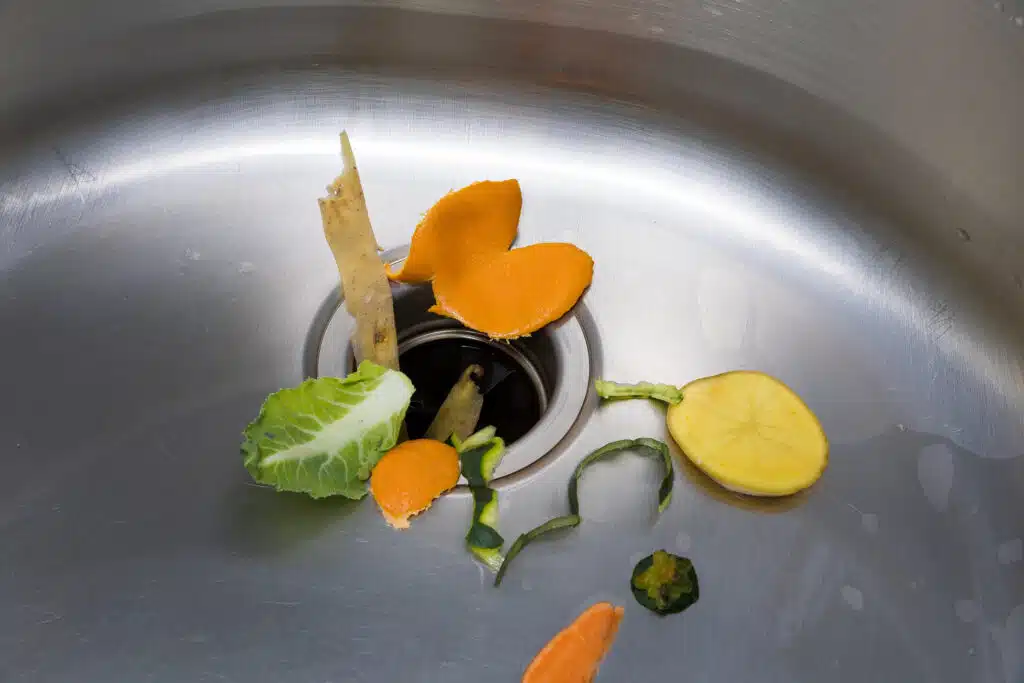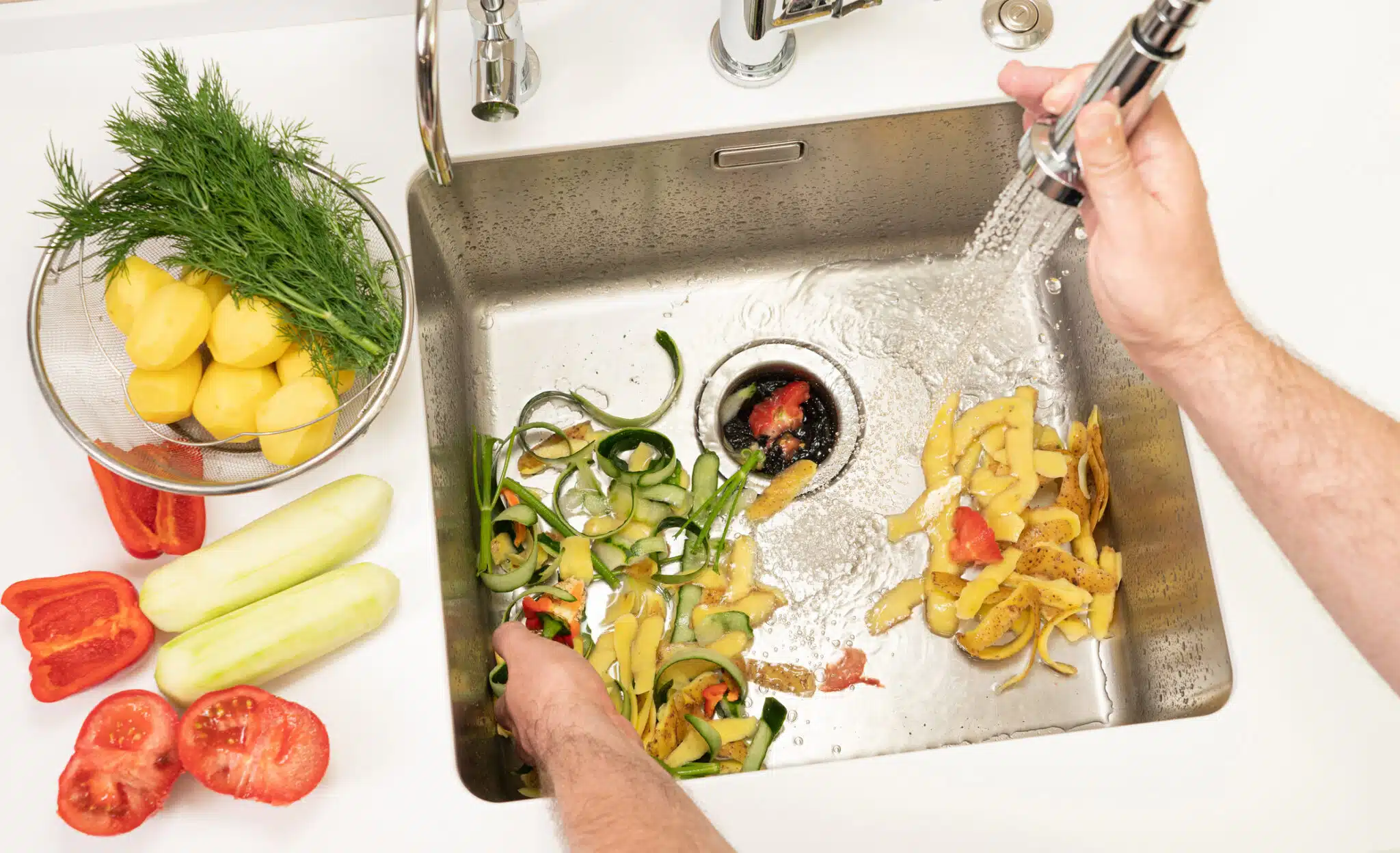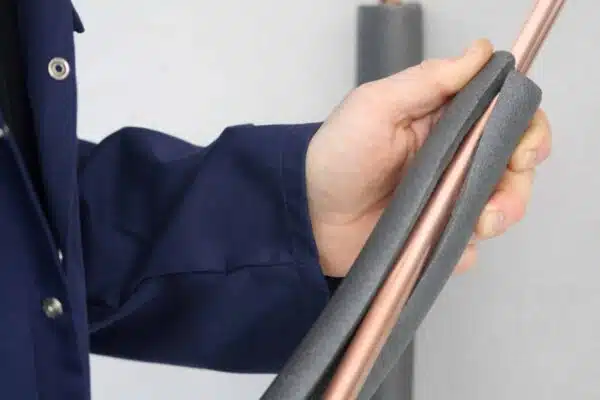To extend the lifespan of your garbage disposal, follow these simple maintenance tips:
- Use Cold Water – Always run cold water when using your disposal to prevent grease from solidifying in your pipes.
- Feed Food Slowly – Avoid overloading by feeding food waste gradually, allowing the unit to process each item thoroughly.
- Avoid Fibrous and Starchy Foods – Keep items like celery, potato peels, and coffee grounds out of the disposal to prevent clogs.
- Clean Regularly – Use baking soda, vinegar, or grind citrus peels to keep your unit clean and odor-free.
Implementing these practices will keep your garbage disposal running smoothly for years!

Did you know that proper care can help your garbage disposal last years longer? Most people don’t think about their garbage disposal until it stops working. But just like any other kitchen appliance, it needs a little attention to keep running smoothly.
Whether you use it daily or just every now and then, taking a few simple steps can prevent costly repairs down the road. Let’s dive into the tips and tricks that will help your garbage disposal run like new for years to come!
Understanding Your Garbage Disposal
Garbage disposals are one of the most useful kitchen gadgets you can have, but not everyone knows how they work or what they need to keep them in tip-top shape.
Knowing the basics about your disposal is the first step to making sure it runs well for as long as possible. So, let’s get familiar with what your garbage disposal actually is and what makes it tick!
What is a Garbage Disposal?
A garbage disposal is an electrically-powered device installed under your kitchen sink that grinds up food waste into small particles, allowing it to be safely washed away through your plumbing.
It helps reduce food scraps in your trash, making kitchen cleanup easier. But remember, it’s not meant to handle everything you want to toss down the drain!
Common Components of a Garbage Disposal
Your disposal is made up of several parts that work together to break down food waste and flush it through your plumbing system.
Understanding these components can help you troubleshoot when something goes wrong or when the unit starts to act up. Let’s take a closer look at the key parts inside your disposal and what each of them does.
- Grinding Chamber: This is the main area where food scraps are processed. The blades inside the grinding chamber spin rapidly to break down food into tiny particles, making it easier to wash away. Over time, this area can become clogged with leftover food particles, so regular cleaning is important to keep it functioning well.
- Impellers: These are small, blunt metal pieces mounted inside the grinding chamber. Despite being called “impellers,” they don’t actually cut the food. Instead, they use centrifugal force to push food waste against the walls of the grinding chamber for a more effective grind. If these parts become dull or damaged, you may notice your disposal is less efficient at breaking down food.
- Motor: The motor is what powers the entire unit. It drives the blades and impellers, making them spin at high speeds to pulverize food. If the motor burns out or overheats, the disposal won’t operate at all. Motors can vary in horsepower, with higher-powered motors being better suited for heavy use.
- Drain Outlet: Once the food waste is ground into small particles, it’s flushed out through the drain outlet into your plumbing system. A clogged drain outlet can cause water and food to back up into your sink, leading to slow drainage and unpleasant odors.
Knowing what each part does can help you quickly identify when something isn’t working correctly.
Whether it’s a strange noise, a clog, or slow performance, understanding the basic components will give you a better idea of what might be wrong and whether you need to call a professional.
Signs Your Garbage Disposal Needs Maintenance
Your garbage disposal can’t send you a text when it’s having issues, but it does give you some clues when it needs maintenance.
Paying attention to these signs can prevent bigger problems and extend its lifespan. Here are a few common indicators that it’s time to give your disposal some TLC.
Unpleasant Odors
That’s often a sign that food particles are trapped inside the disposal or stuck in the drain pipes.
A quick clean-up or a flush with some natural cleaners like baking soda and vinegar can usually solve this problem. If the smell doesn’t go away, it might be time to inspect deeper or call a professional.
Slow Drainage
If you notice water taking longer to drain from your sink, it could mean your garbage disposal is clogged or struggling to process food waste.
Slow drainage is one of the first signs that your disposal is under strain. Fixing it early can prevent larger clogs that could damage your system or even your pipes.
Unusual Noises
Your garbage disposal should sound like a steady hum. Unusual noises could indicate that a foreign object (like a spoon) has accidentally fallen inside, or that internal parts are wearing out. Turn off the unit and carefully check for any visible blockages before running it again.
Tips for Proper Usage
Using your garbage disposal correctly can prevent clogs, jams, and costly repairs. Following a few simple rules will keep it running smoothly and extend its lifespan.
Let’s take a look at what you should and shouldn’t be putting down your disposal, and the right way to feed food into it.
What You Can and Can’t Dispose of:
It’s important to know what belongs in your garbage disposal and what should go straight to the trash. Here’s a quick guide:
Safe to Dispose of:
- Small food scraps: Fruit peels, vegetable bits, and small, soft leftovers.
- Soft items: Cooked pasta, rice, and small amounts of bread.
- Eggshells: Some say they can even help keep the blades clean.
Avoid Putting in the Disposal:
- Fibrous foods: Like celery, corn husks, artichoke leaves, and onion skins. These can wrap around the blades and cause clogs.
- Grease, oils, or fats: These solidify in pipes, leading to serious blockages.
- Large bones or seafood shells: Too hard for the blades to handle, and can cause internal damage.
- Starchy foods: Potato peels, pasta, and rice can expand and become sticky, clogging your system.
Knowing what your disposal can handle will prevent unnecessary wear and tear on the unit, keeping it in good condition for years.
How to Properly Feed Food into the Disposal:
The way you put food into your disposal is just as important as what you put into it.
- Turn on cold water: Start with running cold water to help solidify any grease, making it easier to grind.
- Feed food slowly: Place small amounts of food waste one piece at a time instead of dumping a large batch all at once.
- Let the water run for 15-20 seconds after grinding: This clears out any leftover particles and prevents build-up in the pipes.
- Grind harder items occasionally: Tossing in a few ice cubes can help sharpen the blades and dislodge any debris.
By following these simple steps, you can keep your garbage disposal functioning smoothly, reducing the risk of costly repairs and ensuring it stays in good shape for as long as possible.
Regular Maintenance Practices
Just like any other appliance in your home, your garbage disposal benefits from regular maintenance.
Taking a few minutes each month to clean and inspect it can prevent bigger problems down the line. Here are some simple maintenance practices you can follow to keep your garbage disposal working efficiently.
Cleaning Your Garbage Disposal
To keep your garbage disposal clean and fresh, start by turning off the unit and unplugging it to ensure safety. Pour about half a cup of baking soda into the drain, followed by one cup of vinegar.
Let the mixture fizz for a few minutes; this bubbling reaction helps break down food residue and neutralizes any lingering odors. Once the fizzing stops, rinse thoroughly with hot water. This quick routine can eliminate unpleasant smells and keep the blades sharp.
Grinding Ice and Citrus
A simple and natural way to keep your disposal clean is by using ice and citrus peels. Drop a few ice cubes into the disposal and turn it on. The ice helps dislodge any stuck-on debris inside the grinding chamber.
For a refreshing scent, add a couple of citrus peels, like lemon or orange. The oils from the peels not only provide a pleasant aroma but also help break down any grease build-up inside the unit.
Using Baking Soda and Vinegar
Baking soda and vinegar work wonders when it comes to deep cleaning your disposal. Start by pouring half a cup of baking soda down the disposal. Next, slowly add one cup of white vinegar. Let it sit and fizz for about five to ten minutes.
The foaming action helps to clear out any remaining grime and deodorizes the unit. After the fizzing subsides, flush everything out with hot water. This method will leave your kitchen smelling clean and keep your disposal in great condition.
Avoiding Common Mistakes
Even if you’re using your garbage disposal regularly, certain habits can unknowingly shorten its lifespan.
By avoiding these common mistakes, you can keep your unit running efficiently and prevent costly repairs. Let’s take a look at a few things you should never do when using your disposal.
Overloading the Disposal
One of the most common mistakes is overloading the disposal with too much food at once. Cramming large amounts of waste into the disposal puts unnecessary strain on the motor and blades, leading to jams and even permanent damage.
Always feed food waste gradually, giving the blades enough time to process each piece. Overloading can also cause water and food particles to back up into your sink, which is not only a hassle but can lead to unpleasant odors.
Running Hot Water Continuously
Many people believe that running hot water while using the garbage disposal helps to break down food more effectively. However, this is a misconception. Hot water actually melts grease and fats, causing them to cling to the pipes and harden as they cool.
Over time, this can lead to clogs in your plumbing. Instead, use cold water, which keeps fats and grease solid so they can be chopped up and flushed out properly without sticking to the sides of your pipes.
Ignoring Jams and Clogs
If your garbage disposal is making unusual noises or isn’t grinding as efficiently, don’t just ignore it and hope the problem will resolve itself. Running the disposal when it’s jammed or clogged can cause significant damage to the motor.
Always turn off the unit and unplug it before attempting to clear any obstruction manually. If you can’t fix it easily, it’s best to call a professional to avoid further damage.
When to Call a Professional
There are times when basic maintenance and DIY fixes just aren’t enough. Knowing when to call a professional can save you from turning a minor issue into a major repair. Here are some situations where it’s best to let an expert step in.
Identifying Serious Problems
If your unit is frequently jamming, making strange noises, or not turning on at all, these are signs of a more serious issue.
A professional can inspect the system to pinpoint the exact problem, whether it’s a faulty motor, worn-out blades, or electrical issues. Trying to repair these yourself could lead to further complications and even pose a safety risk.
Regular Inspections
Even if your disposal seems to be working fine, scheduling regular inspections is a smart idea, especially for older units.
A licensed plumber can spot early signs of wear and tear and recommend maintenance or replacements before a small problem turns into an expensive one. This preventative approach will help ensure your unit stays in good condition and functions efficiently.
Extending the Lifespan of Your Unit
If you want to make your disposal last longer, a little extra effort can go a long way. Upgrading certain features or considering service plans are options that can help you get the most out of your unit.
Upgrading Your Disposal
Older units may not have the efficiency or power that newer models offer. If your disposal frequently clogs, struggles with basic tasks, or is noisy, it might be time to consider upgrading.
Modern units come equipped with more powerful motors, noise reduction features, and stainless steel components that are resistant to wear and tear. By investing in an upgraded model, you’ll benefit from better performance and fewer maintenance issues down the road.
Warranty and Service Plans
A warranty or service plan can be a lifesaver, especially if you’ve recently purchased a new unit. Most warranties cover parts and labor for a set period, which can save you money on unexpected repairs. Consider investing in an extended warranty or service plan that includes regular maintenance visits.
This way, a professional can check your system periodically, making sure everything is functioning correctly and giving you peace of mind that your disposal is protected.
Ready to Give Your Garbage Disposal Some TLC?
If your unit is acting up or just needs a little maintenance, the experts at Benjamin Franklin Plumbing of Lancaster are here to help! Serving Lancaster, York, and Harrisburg, PA, we specialize in keeping your disposal running smoothly.
Don’t wait until a small issue turns into a big problem—reach out to our team today for reliable service that keeps your kitchen in top shape!

FAQs
How long do garbage disposals typically last?
On average, a well-maintained unit can last around 10 to 12 years. Proper usage, regular cleaning, and avoiding overloading the system will help ensure it reaches or even exceeds its expected lifespan.
Can I use bleach to clean my disposal?
It’s not recommended. Bleach is too harsh and can corrode the metal components of the unit over time. Instead, opt for natural cleaning solutions like baking soda and vinegar or grind up some citrus peels for a fresher smell.
What should I do if my disposal is jammed?
First, turn off the power to the unit and unplug it. Use a flashlight to see if there’s a visible blockage. If you find something stuck, use a pair of pliers or tongs to gently remove it. Never use your hands! If you can’t identify the issue, it’s best to call a professional.
Are there any foods I should never put in it?
Yes, avoid putting fibrous foods like celery, corn husks, and potato peels, as well as grease, oils, and large bones. These items can either wrap around the blades, cause clogs, or damage the internal components.
What’s the best way to keep my disposal smelling fresh?
A simple and effective way to keep it fresh is by grinding up citrus peels (like lemons or oranges) and flushing it with cold water. The natural oils will help break down any lingering grease and leave a clean, citrusy scent.





















